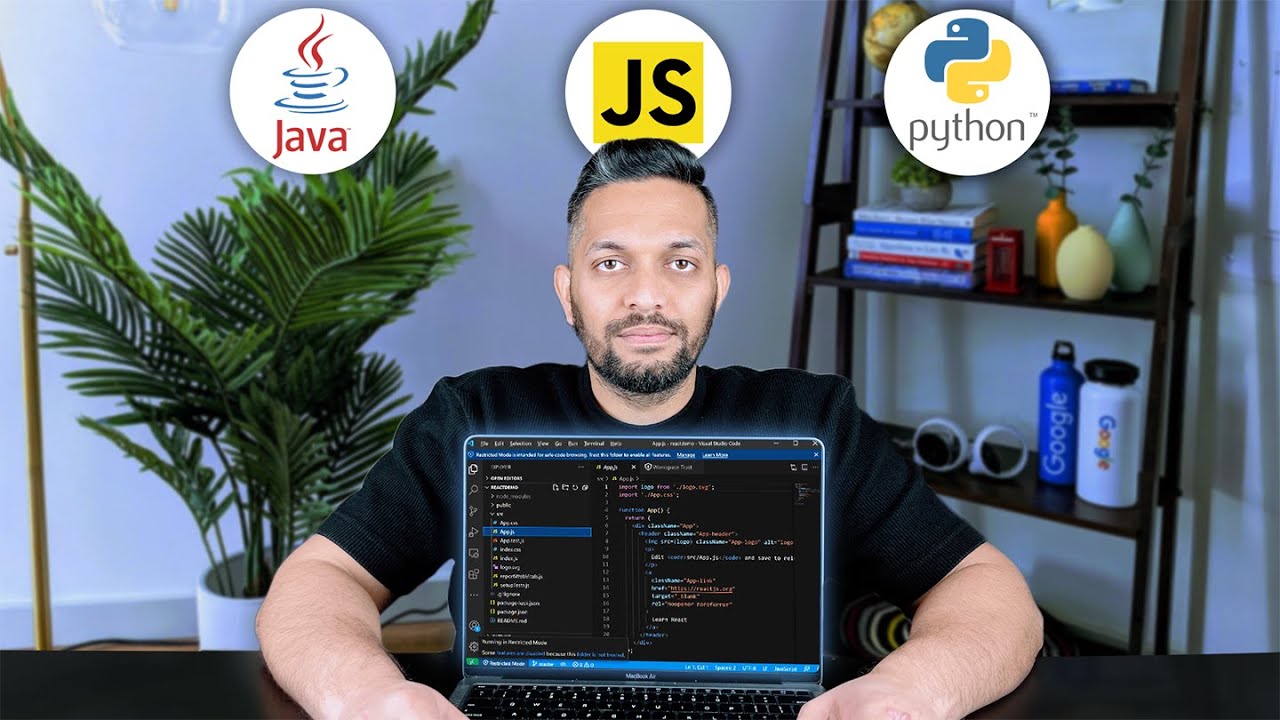How I Would Learn Python FAST in 2024 (if I could start over)
Summary
TLDRThis video offers a comprehensive guide for beginners to learn Python efficiently. It addresses the relevance of Python in the AI era, emphasizing its demand and the ability to build applications with AI. The speaker suggests starting with an online editor like Repl.it or Google Collab, then progressing to local development with tools like Visual Studio Code. A mind map outlines learning stages from basics to advanced topics. The video advocates for learning by doing, creating projects, and teaching others to solidify knowledge, overcoming the 'valley of despair' in the learning process. It also mentions using AI tools like GitHub Copilot to enhance coding efficiency.
Takeaways
- 🐍 Learning Python is still highly valuable in the era of AI, as it empowers you to build applications on top of AI models.
- 🚀 You can reach an intermediate level in Python within 3 months or less if you learn it the right way.
- 💡 Python's demand remains high, and proficiency in it helps you verify and correct AI-generated code.
- 👨💻 Choosing the right development environment depends on your goals, whether for development, data analysis, or AI.
- 🌐 Online code editors like Repl.it and hosted services like Google Colab are good starting points for learning Python.
- 💻 For long-term learning, installing Python locally and using an integrated development environment (IDE) like Visual Studio Code is recommended.
- 📚 The basics of Python include understanding data types, variables, functions, and control flows like conditional statements and loops.
- 📈 Intermediate Python learning involves working with files, version control, data science libraries, and object-oriented programming.
- 🛠️ Good coding practices are crucial, including following style guides, using meaningful variable names, and writing clean, efficient code.
- 🏆 Advanced Python learning allows you to build complex applications, use APIs, develop web apps, and deploy applications on cloud platforms.
- 🔄 The best way to learn is through a cycle of learning, doing, and teaching, which helps solidify knowledge and reveal gaps in understanding.
Q & A
Why is Python still worth learning despite the rise of AI?
-Python remains one of the most in-demand programming languages and is essential for building applications on top of AI models. It allows users to be creators rather than just consumers of AI, and it's crucial for verifying and correcting AI-generated code.
What are the potential risks of relying solely on AI-generated code?
-AI-generated code may contain errors or 'hallucinations' that can be harmless in other contexts but could be fatal in coding, such as inadvertently installing malware.
What is the recommended approach to learning Python if starting from scratch?
-The recommended approach is to focus on learning the basics first, such as variables, data types, and functions, and then gradually move to more advanced topics like data science, machine learning, and object-oriented programming.
What are some beginner-friendly development environments for Python?
-For beginners, online code editors like Repl.it or hosted services like Google Colab are recommended as they require no setup and provide a user-friendly environment to start coding immediately.
Why is it beneficial to learn Python for data science and machine learning?
-Python is widely used in data science and machine learning due to its simplicity and the powerful libraries available like NumPy, pandas, Matplotlib, and scikit-learn, which facilitate data analysis and machine learning tasks.
What are some good coding practices that should be followed when learning Python?
-Good coding practices include following the Python style guide, using meaningful variable names, avoiding hard coding, utilizing list comprehensions and generators, adding error handling, commenting and documenting code, and using virtual environments for package management.
How can one avoid getting overwhelmed while learning Python?
-To avoid feeling overwhelmed, focus on learning with a purpose, such as solving a specific problem through a personal project. This helps shift the focus from perceived incompetence to learning what is necessary to solve real-life problems.
What is the significance of teaching what you've learned in Python?
-Teaching what you've learned helps solidify your understanding, reveals gaps in knowledge, and deepens your learning. It's a powerful way to reinforce concepts and improve problem-solving skills.
How can GitHub Copilot assist in Python development?
-GitHub Copilot can assist by writing code faster and reducing errors, allowing developers to focus more on the creative process and idea development rather than getting bogged down with syntax or data type issues.
What is the 'Dunning-Kruger effect' mentioned in the script, and how does it relate to learning Python?
-The Dunning-Kruger effect is a cognitive bias where people with low ability at a task overestimate their ability. In the context of learning Python, beginners might feel they are making rapid progress initially but then hit a point where they realize how much they still need to learn, which can lead to a dip in confidence and motivation.
Outlines

このセクションは有料ユーザー限定です。 アクセスするには、アップグレードをお願いします。
今すぐアップグレードMindmap

このセクションは有料ユーザー限定です。 アクセスするには、アップグレードをお願いします。
今すぐアップグレードKeywords

このセクションは有料ユーザー限定です。 アクセスするには、アップグレードをお願いします。
今すぐアップグレードHighlights

このセクションは有料ユーザー限定です。 アクセスするには、アップグレードをお願いします。
今すぐアップグレードTranscripts

このセクションは有料ユーザー限定です。 アクセスするには、アップグレードをお願いします。
今すぐアップグレード関連動画をさらに表示

How I would learn Python if I was to start all over again

Fastest way to become a Software Engineer in 2024

3 Developer Roadmaps That Actually Work

Python Programming - Basic Input and Output - print and input functions

How I Would Learn Python in 2024 (if I could start over)

Beginner Python Tutorial 1 - Introduction
5.0 / 5 (0 votes)
